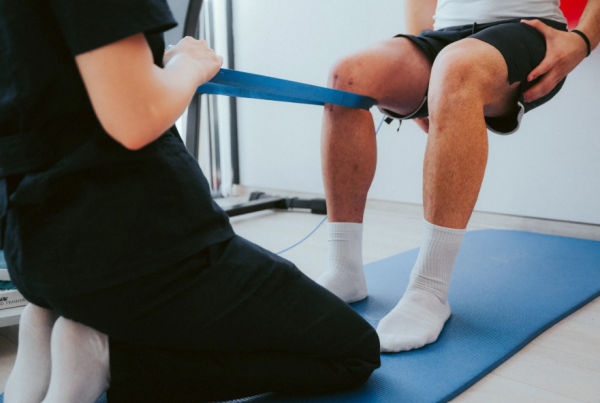At the start of each and every exercise physiology program, we spend some time reflecting on the goals of the program. We like to categorise the overarching goal into one of these three categories, depending on what has been requested of us by the insurer:
- Return to work: We have been requested to help return that client to some form of paid work (whether within their same pre-disability role or into a new role) by the end of our involvement.
- Work readiness: The long-term goal is to return the individual to work, however it is not necessarily expected to happen within the program. We are aiming to help prepare them for a potential return to work in future.
- Well-being: There is no immediate return to work goal for this cohort. The aim of the program is purely to improve that individual’s wellbeing whether they’re preparing for a future RTW or not.
As you can see, the goals have a hierarchy. The best-case scenario for all is getting someone back to work, in a role where they are happy, productive, and their workload is sustainable (improving well-being is important too of course, but if we can do this while also improving work hours, it’s a win all around!). By setting these goals from the start, we know what we are aiming for, and we can build our program from that point backward.
A mental health case study
Achieving the goal that has been set out for us is a great success. But even better is achieving the goal on the level above! This was exactly what Carmyn, our exercise physiologist in Christchurch, managed to achieve.
Her client, who was on a mental health-related claim at the time, was referred to her for a ‘work readiness’ program in May this year. Let’s call her Marise.

Marise had ceased work approximately 10 months earlier due to a negative workplace environment, formally resigning from her role soon after. At the time of meeting Carmyn, she was job-detached, with no specific ‘next direction’ in mind. We were engaged to help her build an exercise regime where she could hopefully use the gains achieved to feel more confident in starting to look for a role by the end of our program.
From originally being a bubbly, outgoing, and comedic member of the team, the anxiety and paranoia that had plagued her within her workplace had followed her into her personal life. Marise was worried about going out in public for fear of seeing old colleagues, so for almost 5 months, she didn’t leave her home. Paranoia and anxiety surrounded the thought of going to the mall, to the gym, out for a meal, or even seeing friends. Speaking to anyone became a cause of distress. She was at the point where she was barely showering, let alone keeping up with the usual household chores. Confidence plummeted, and she was tearful much of the time.
With her ‘work readiness’ goal top of mind, Carmyn set out with a few sub-goals…
- Improve motivation for daily tasks – self care, exercise and household chores,
- Build confidence to reduce anxiety around returning to work
Carmyn challenged Marise straight away by basing the program in a local gym, where she was around other people, with Carmyn there for support. Carmyn guided her through a range of strength and aerobic exercises, starting with 2 sessions together per week and eventually tapering down to once weekly, with Marise continuing her independent sessions at the gym and pool once she had built up her confidence. The emphasis was on boosting those feel-good endorphins that come from exercise – helping to reduce anxiety, improve energy and motivation.
They also worked on setting small goals with self-efficacy in mind – such as cleaning the house fortnightly, visiting the mall, buying a coffee, and engaging in conversation with someone at the gym. As her confidence grew and Marise noticed her energy levels improve, she started to show an interest in using her free time more wisely. They worked together to find volunteer work that Marise could do.
And then… A job came up on Marise’s radar. She was invited for an interview… And was offered the job! Only 4 months into the program, Marise was able to make a full-time return to work! Not only this, but she thrived in her new role, got along great with the new colleagues, and even remained consistent with her 3 exercise sessions per week.
From a ‘work readiness’ goal to full-time work in a matter of months, Marise went above and beyond the original goal. It’s a success story that we couldn’t help but share! So what was the ‘secret sauce’? We asked Carmyn…
“A lot of her success started with being able to trust me and feel comfortable around me”
By starting small and focusing on confidence building, Marise was able to gradually start putting herself back out there again.
Well done Carmyn for creating that safe environment for Marise to grow in confidence, and ultimately achieve these awesome outcomes!
Author: Yolanda van Vugt Clinical Exercise Physiologist and Content Creator at Specialised Health
Let’s connect, find us:
Have you got a claimant that would benefit from E.P. support? Refer to the team!
#exercisephysiology #exerciserehab #rehabilitation #lifeinsurance #incomeprotection #ctp #workcover #mobile #mobileexercisephysiology #returntowork #fatigue #mentalhealth #cancer #musculoskeletal #pain #physio #physiotherapy #Sydney #Brisbane #Melbourne #Adelaide #Auckland #Waikato #BayofPlenty #Wellington #Otago #Christchurch



